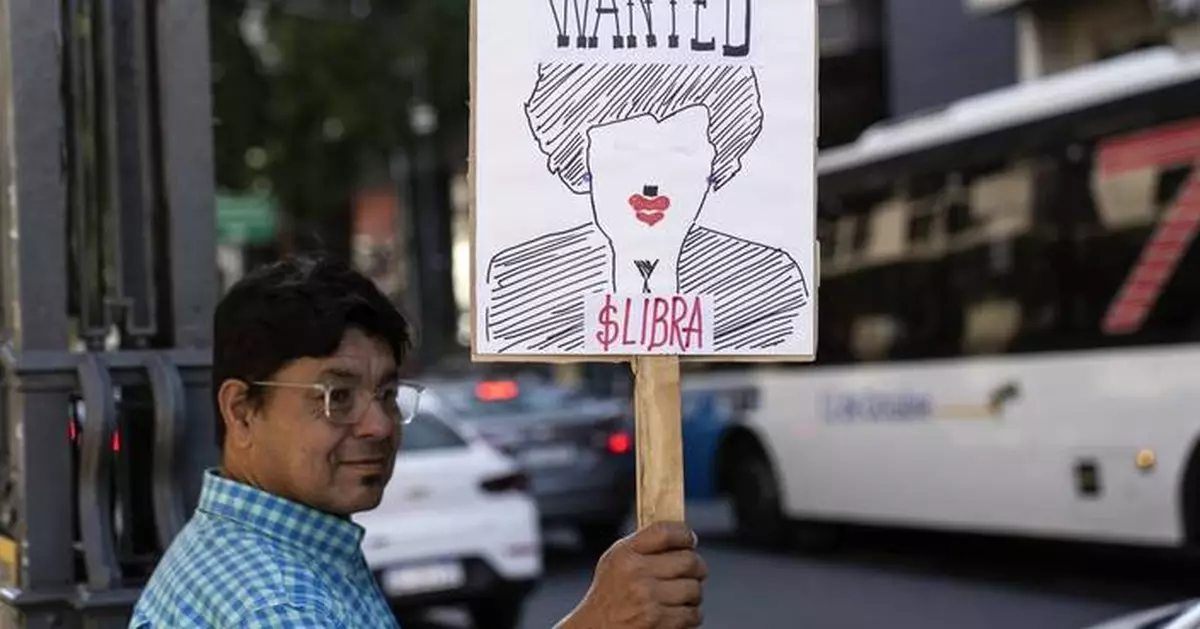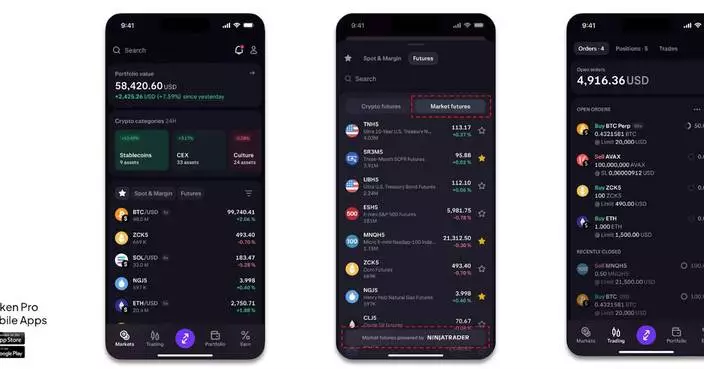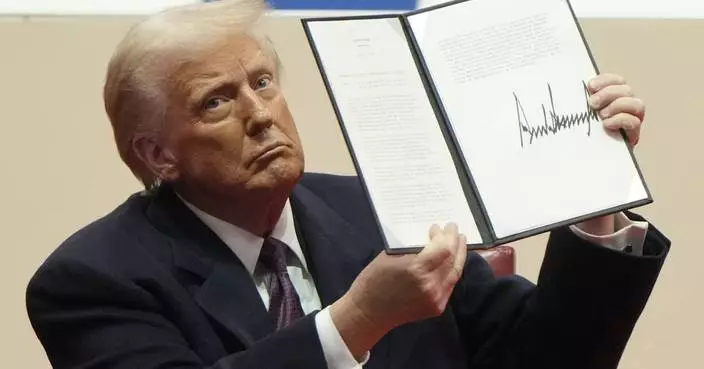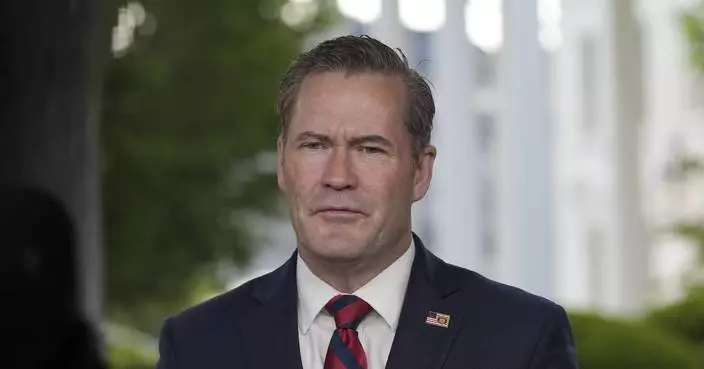BUENOS AIRES, Argentina (AP) — Argentine President Javier Milei is facing a corruption probe into his promotion of a meme coin, which is a highly speculative form of cryptocurrency that’s surged in popularity after President Donald Trump and his wife launched tokens of their own.
The budding scandal in Argentina has been dubbed locally as “cryptogate” and has links to a diverse cast of characters, including a high-profile U.S. influencer, a crypto developer who uses the pseudonym “Meow,” and a 28-year-old American entrepreneur who said he helped launch first lady Melania Trump’s meme coin last month.
Here’s an explainer on what happened and where things stand:
Meme coins are a type of cryptocurrency that are generally just goofs on internet memes, viral moments or celebrities that aren’t trying to make use of a new technology or solve any new problems. They often have silly names, like Dogecoin, or Fartcoin.
Critics – including many cryptocurrency enthusiasts — say they are nothing more than digital Ponzi schemes that exist to enrich insiders at the expense of retail investors. Those more supportive say meme coins shouldn’t be so easily dismissed and could be early indicators of ways in which the internet could revolutionize financial and other transactions.
“New technologies often look like a toy but evolve into something much more powerful over time,” Coinbase CEO Brian Armstrong said in a recent social media post.
In short, a disaster.
Milei, the tech-loving, chainsaw-wielding, libertarian president of Argentina, posted on X about the meme coin $LIBRA on Friday, just after it had launched, stating he was “encouraging economic growth by funding small businesses and startups.”
The coin’s price soared almost immediately, pushing the market value for the project beyond $4 billion.
A few hours after launch, early holders of the coin started cashing out of the project and its price collapsed.
The trajectory of $LIBRA’s price had the hallmarks of a “rug pull,” a not uncommon phenomenon with meme coins. Rug pulls occur when insiders dump their holdings in newly launched meme coins that are soaring in value, which tanks the price and causes losses to newer investors.
Milei deleted his initial post after the price collapsed and distanced himself from the project. By Monday, dozens of criminal complaints had been filed, a judge in Argentina had been selected to investigate allegations of fraud and Argentina’s main opposition party called for his impeachment.
On Friday, a federal prosecutor formally opened the probe to determine the involvement of Milei and five others in the creation and promotion of $LIBRA, for the possible crimes of bribery, fraud, influence peddling and abuse of authority.
A defiant Milei insisted he had acted in good faith and said that he had asked the Justice Ministry’s Anti-Corruption Office to investigate if he or anyone else had committed wrongdoing.
Hayden Davis, a 28-year-old American crypto developer who said he’s an adviser to Milei and helped launch $LIBRA, has emerged as a central figure. Milei’s office said the government has no connection to Davis.
In an interview with independent crypto journalist Stephen Findeisen, Davis said that meme coins are essentially a rigged game that benefit a small group of people at the expense of retail investors.
“It is an insiders’ game. This is an unregulated casino,” Davis said.
Davis said the $LIBRA coin was not a rug pull but was supposed to be an experiment to show the power and utility of digital currency that’s consistent with Milei’s desire for Argentina to be a hub for innovation.
Davis also said he was involved in the launch of Melania Trump’s meme coin. Launched just before her husband took office, that meme coin’s price underwent a similar trajectory as $LIBRA — quickly soaring upon launch and then dropping. The first lady’s office declined to comment.
Online influencer Dave Portnoy, who founded the Barstool Sports podcast empire and is a vocal gambling enthusiast, said on social media that Davis had told him about $LIBRA’s launch before it went public and asked him to promote it.
Portnoy said there were also discussions about the possibility of him interviewing Milei, much like he’d done with President Donald Trump during his first term. Portnoy said he did not buy any $LIBRA until after Milei’s post on X and lost money on the purchase when the price crashed. Davis said he reimbursed Portnoy’s losses.
“Meow” is the anonymous co-founder of a crypto firm involved in launching meme coins, including $LIBRA, said on social media that they were confident that no one at the firms had been involved in insider trading or financial wrongdoing. Still, Meow said the company had hired a law firm to conduct an independent investigation and that one of the company’s leaders had resigned for showing “a lack of judgement.”
Cryptogate represents the first big scandal of Milei’s presidency. Analysts said it risks eroding public confidence in Milei, who rose to prominence as an iconoclastic economist vowing to tame Argentina’s sky-high inflation and eliminate corruption among the political elite.
Questions remain over how this will affect the Milei administration’s perception among foreign investors at a crucial time in which the government is hoping to ease strict currency controls and negotiate a loan with the International Monetary Fund. He is now in Washington meeting with Tesla chief Elon Musk and other high-profile tech leaders in a bid to generate hype for his economic overhaul.
Meme coins don’t appear to be going away anytime soon, but their track record should serve as a cautionary tale for investors and creators alike.
The meme coins promoted by Trump and his wife have seen their prices fall dramatically since the days after their launch and drawn criticism from some Democrats and crypto enthusiasts.
Hailey Welch, better known as Hawk Tuah Girl, saw her popularity plummet after her meme coin collapsed amid allegations of a rug pull. And celebrity Caitlyn Jenner is the defendant in an ongoing class action lawsuit filed by investors who said they were duped into losing money on the $JENNER meme coin. Welch and Jenner have both denied wrongdoing.
The impoverished Central African Republic issued a meme coin earlier this month. After a brief spike, its price has also collapsed.
Suderman reported from Richmond, Virginia.

Riot police stand guard as a demonstrator holds a banner depicting the $Libra cryptocurrency during a protest organized by retirees demanding better pensions, in Buenos Aires, Argentina, Wednesday, Feb. 19, 2025. (AP Photo/Rodrigo Abd)
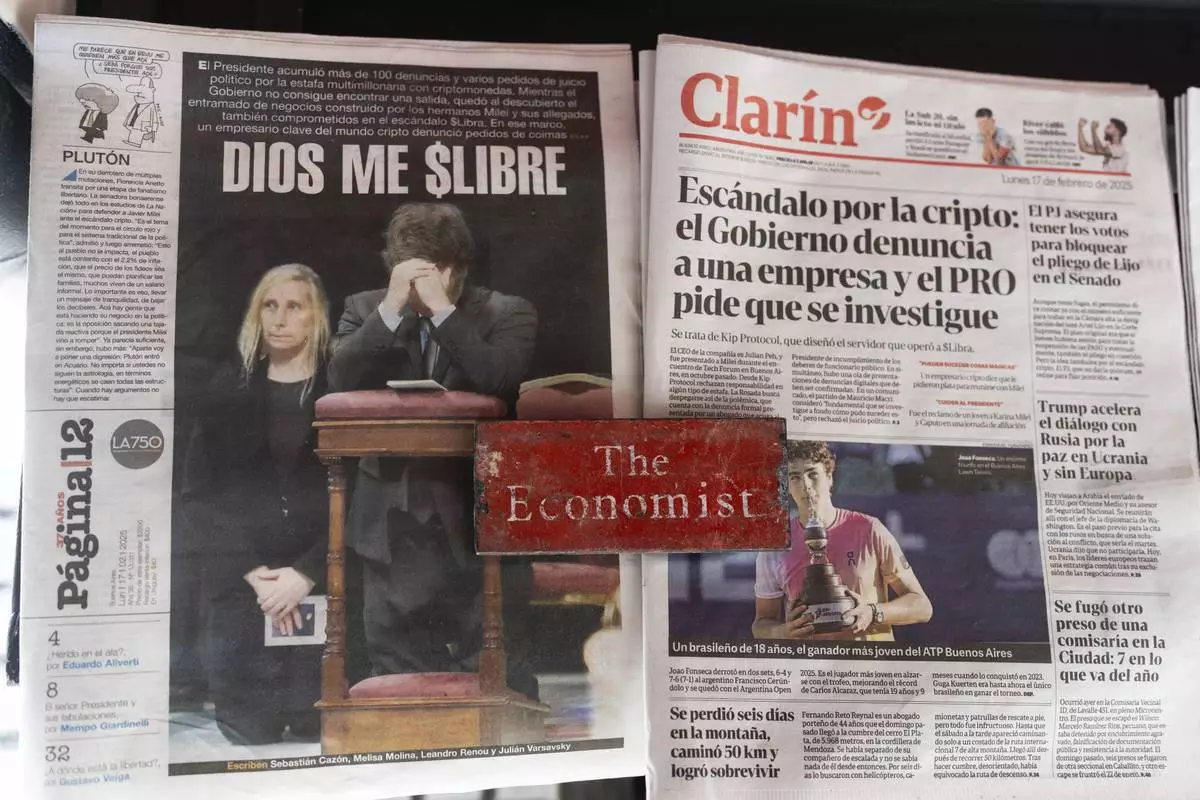
The national newspapers Clarin, right, and Pagin 12, left, are displayed for sale at a newsstand outside La Casa Rosada presidential office carrying headlines on a cryptocurrency scandal involving President Javier Milei in Buenos Aires, Argentina, Monday, Feb. 17, 2025. (AP Photo/Rodrigo Abd)

Argentina's President Javier Milei holds up a chainsaw as he arrives to speak at the Conservative Political Action Conference, CPAC, at the Gaylord National Resort & Convention Center, Thursday, Feb. 20, 2025, in Oxon Hill, Md. (AP Photo/Jose Luis Magana)
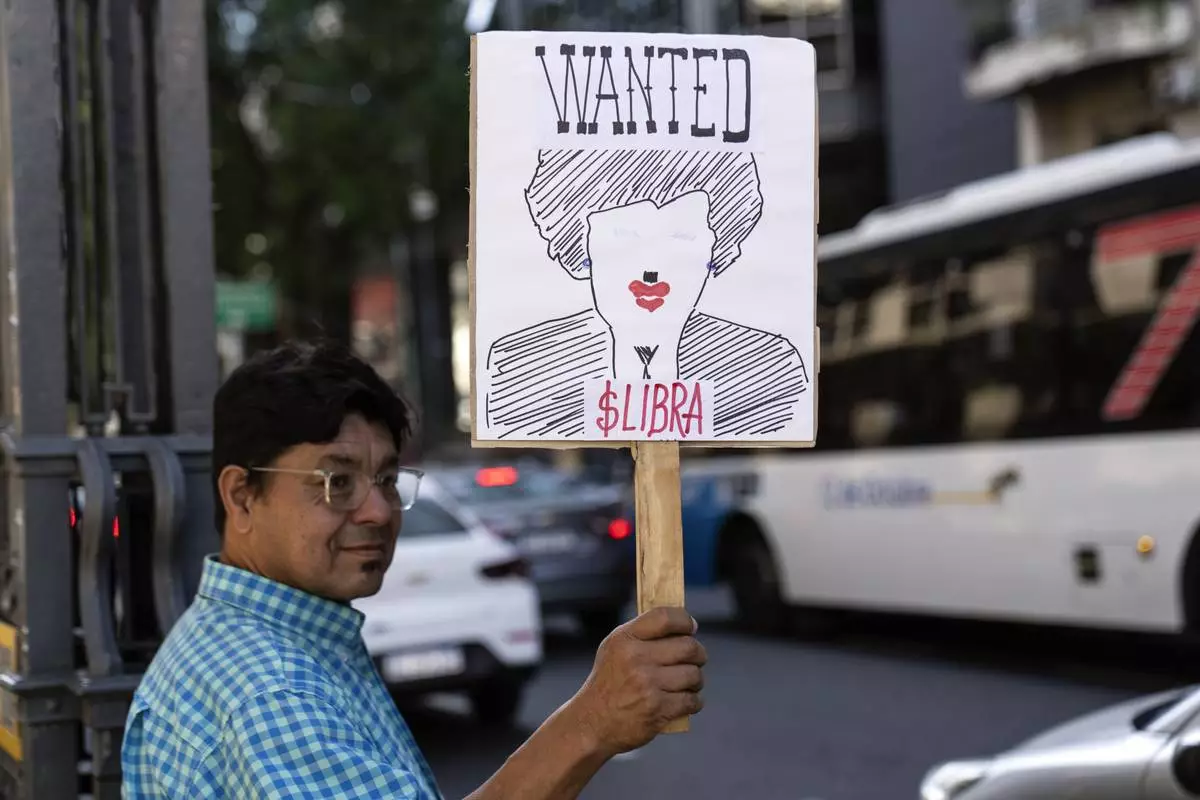
A demonstrator holds a banner depicting President Javier Milei and the $Libra cryptocurrency during a protest organized by retirees demanding better pensions, in Buenos Aires, Argentina, Wednesday, Feb. 19, 2025. (AP Photo/Rodrigo Abd)
WASHINGTON (AP) — To understand the Justice Department's struggles in representing President Donald Trump's positions in court, look no further than a quick succession of losses last week that dealt a setback to the administration's agenda.
In orders spanning different courthouses, judges blocked a White House plan to add a proof-of-citizenship requirement to the federal voter registration form, ruled the Republican administration violated a settlement agreement by deporting a man to El Salvador and halted directives that threatened to cut federal funding for public schools with diversity, equity and inclusion programs.
That's on top of arguments in which two judges expressed misgivings to a Justice Department lawyer about the legality of Trump executive orders targeting major law firms and a department lawyer's accidental filing of an internal memo in court questioning the Trump administration’s legal strategy to kill Manhattan’s congestion toll — a blunder the Transportation Department called “legal malpractice.”
According to an Associated Press tally, Trump executive actions have been partially or fully blocked by the courts around 70 times while judges have not impeded the president's orders in nearly 50 cases. Dozens of others are pending.
The Trump administration's effort to reshape American civil society, including a crackdown on illegal immigration and downsizing of the federal government, is encountering resistance from judges across a broad spectrum of philosophical leanings as lawyers for the Justice Department in some cases have strained to answer straightforward questions from judges about the basis or rationale for a particular policy or about the mechanics of its implementation. In at least one instance, a government lawyer who became openly exasperated in court at the lack of information he’d been given from the administration was soon after fired by the Justice Department.
Compounding the problem is an ongoing exodus from the department of experienced career lawyers accustomed to representing the federal government in court. Some of the key arguments in recent weeks have been handled by lawyers newly hired into political, rather than career, positions at the department.
Justice Department leadership has in recent months hired lawyers with conservative credentials from law firms in Washington and with past experience at state and local government agencies — but not necessarily federal experience.
“This is quite rare, if not unprecedented,” said Boston College law professor Kent Greenfield. “I can't think of another instance in which the Justice Department has lost so many cases in a short period of time and the reason they're losing is because they're wrong — and obviously wrong.”
Trump administration officials, including Attorney General Pam Bondi, have attributed the losses to what they call “activist” judges bent on impeding his agenda. Some White House allies have called for impeaching judges, with adviser Elon Musk describing it as a “judicial coup.”
But that belies the reality that some of the most blistering rebukes of Justice Department arguments have come from conservative judges like J. Harvie Wilkinson III, an appointee of Republican President Ronald Reagan who said in an April opinion that the idea the government could not return to the U.S. a man it had deported to El Salvador was “shocking not only to judges, but to the intuitive sense of liberty that Americans far removed from courthouses still hold dear."
Jonathan Turley, a George Washington University law professor, cautioned against making too much so soon in the administration of its legal track record. The Supreme Court with its conservative 6-3 majority, including three Trump appointees, has yet to weigh in on the vast majority of the cases.
“This Department of Justice will continue to defend President Trump’s agenda in court, and we remain confident that we will ultimately prevail,” Justice Department spokesperson Chad Gilmartin said in an email.
The Trump administration has also succeeded in some cases in beating back legal challenges, and some early defeats at the trial court level have been subsequently overturned by a federal appeals court, such as when a panel cleared the way for the administration to fire thousands of probationary workers in spite of a judge’s earlier opinion.
In another case, the Supreme Court overturned a lower judge's order that had blocked the administration from using an 18th-century wartime law to deport Venezuelan migrants, though the court said they must get a chance to challenge their removals before they're taken from the United States. The Supreme Court also recently granted the Trump administration’s plea to cut hundreds of millions of dollars in teacher training money while a lawsuit continues.
“There’s over 600 District Court judges, any one of which can issue limited or national injunctions,” Turley said. The rulings may be important, he added, “but there’s a great deal of runway between a U.S. district court and the United States Supreme Court.
The challenges, however, were laid bare in a Washington courtroom just last week when Richard Lawson, a newly minted deputy associate attorney general, repeatedly struggled to provide what a judge said was “basic” information about one in a series of executive orders targeting a major law firm with punishing sanctions — including the suspension of attorney security clearances.
“So you don’t know whether the firm or the individuals whose security clearances were suspended have been given any notice about the timing of the review, who the decision-maker is, the information that’s being reviewed as part of this review, whether they’re going to have an ability to see that information, comment on the information, correct the information, object to the information?” U.S. District Judge Beryl Howell asked pointedly. “You can’t tell me anything about that?”
“I can't speak to that, Your Honor," replied Lawson, who years before recently joining the Justice Department had worked with Bondi in the Florida attorney general's office and was also a lawyer at a pro-Trump think tank called the America First Policy Institute.
Lawson fared no better weeks earlier when pushed to explain the administration's national security rationale for punishing a different law firm, Jenner & Block, because one of its former partners, Andrew Weissmann, had years earlier been a prosecutor on the team of special counsel Robert Mueller that investigated Trump during his first term.
“You’re not going to really tell me that having someone employed four years ago poses some kind of national security threat?” asked U.S. District John Bates, an appointee of George W. Bush, a Republican.
“Not per se, no,” replied Lawson.
In another case, Judge Colleen Kollar-Kotelly scolded the Justice Department in court papers last week over what she described as the “contradiction” between statements made in court by one of its lawyers “and the facts on the ground.” While the judge did not contend that the lawyer "intentionally misrepresented the facts," the appointee of Democratic President Bill Clinton added: “The Court must remark that this exchange does not reflect the level of diligence the Court expects from any litigant — let alone the United States Department of Justice."
Stuart Gerson, who led the Justice Department’s civil division under Republican President George H.W. Bush and later served briefly as acting attorney general, said it appeared the Trump administration was sending lawyers into court "without adequate information and instructions.”
“I sympathize greatly with these folks who are arguing some of the cases, who are just parroting what they’ve been told to say without being able to answer questions about their ramifications, the what-ifs and the background information,” Gerson said.
Follow the AP's coverage of the U.S. Department of Justice at https://apnews.com/hub/us-department-of-justice.
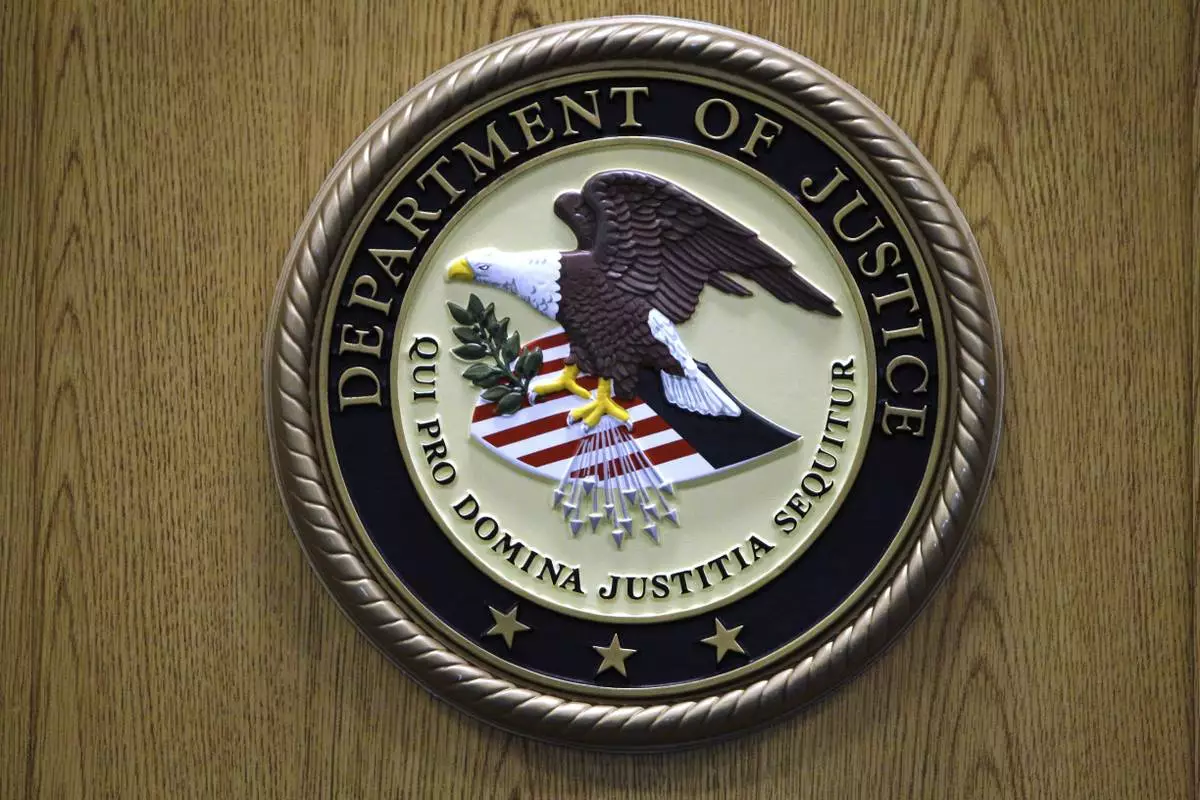
FILE - The Department of Justice logo is shown on a podium during a news conference, Sept. 30, 2010, in Philadelphia. (AP Photo/Matt Slocum, File)






